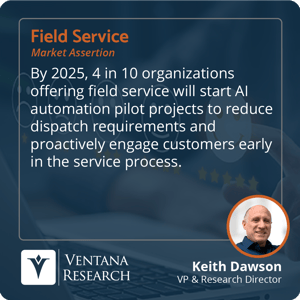It often takes longer to adopt new technology in the customer service delivery environment than in other business areas. In fact, service operations are among the most efficient and well-organized processes (despite what consumers might think). Because both the processes and the technology that drive them are deeply engrained in many companies, many people resist large-scale transformation projects because of their disruption and the uncertainty of outcomes.
Those that are using long-standing platforms purpose-built for service ops can take some comfort from the fact that vendors like ServiceNow are taking a careful, deliberate approach to enhancing their solutions. The company recently rolled out its latest release, called Vancouver, with impressive and very timely improvements that provide users with a steady path towards new technology for service management. The progress made over the past few releases — from Tokyo through Utah to this latest iteration — shows an awareness of the deep details involved in service management, from building out messaging channels to workforce optimization to role-based dashboards. It should be clear to any objective observer that the ServiceNow platform is as complete a toolkit for service both inside and outside contact centers as can be found on the market.
The industry has a sort of artificial intelligence (AI) fever right now, resulting in a very haphazard and confusing array of features and proposed benefits from many vendors. This is leaving buyers somewhat confused about how to prioritize specific needs, and how to differentiate between complex offerings that are making bold promises about AI’s appropriateness.
ServiceNow’s approach to AI in the platform has been sensible and measured. It applies generative AI to very specific features and use cases where it can show measurable results: summarization of chats and cases in particular, and knowledge-based automated assistance in agent-led and self-service options. This brings the company’s AI options to parity with those of its leading peer vendors.
AI is not just a new technology, but an amplification of one of the key technologies that ServiceNow has expertise in, which is knowledge management. The real story of AI in service over the next few years isn’t going to be just about summarization and time-savings (even though those are excellent use cases). Instead, it will be about how AI finally provides a way to organize and maintain vast repositories of relevant knowledge for use in all sorts of service-related applications. Knowledge is the key to better service outcomes, and AI is the key to mastering that knowledge. Few vendors are making that connection clear to buyers.
There is a fundamental shift going on in contact centers right now: the paradigm of organizing the center’s tech stack around the ACD (and by extension, interaction handling) is giving way to a new mode in which the communications channels take a back seat to the internal process control issues that make those interactions successful. Buyers can make any element of the stack the centerpiece, either the interaction handling (as in the past) or platform tools like CRM or field service. ServiceNow can plausibly argue for its own central position as the knowledge, case, and workflow vendor that directs service outcomes. As the pool of buyers expands beyond service and IT professionals to include customer experience (CX) teams that are often more marketing and sales-centric, ServiceNow needs to talk to those folks in terms of their roles, emphasizing integrated capabilities and revenue-based outcomes.
The transition from basic interaction handling as the core to a focus on processes that span departments positions ServiceNow to take advantage of this shift. The company has three things working in its favor: deep expertise in service operations management, similarly deep understanding of IT teams and their needs, and a foundational platform that encourages the addition of specific applications for many use cases across the enterprise.
The Vancouver release solidifies this notion by filling in some of the important features that are necessary in contact centers and adjacent service environments. Tools for automating agent operations are getting better all the time, as are those that link customers' experiences as they move from self-service to agented service. Many of the key features in this release are becoming table stakes for buyers: portal widgets, agent assist, case and interaction summaries via AI — these are features that we find becoming standard for top tier platforms. ServiceNow’s approach appears to be a little more cautious than some others, resisting the idea that AI is the panacea to all service ops problems but acknowledging the utility of certain applications in certain contexts.
I recommend vendors lean more towards the very practical nuts-and-bolts approach ServiceNow is taking with regard to adding AI components, rooted in a "what can this do for me today?" buyer mindset. With its IT history, ServiceNow is particularly well suited to deliver that message and can benefit from getting even more granular in highlighting the TCO and ROI advantages of its platform improvements.
The plumbing that underlies interaction routing, including agented and self-service, is widely available and not necessarily distinctive or differentiated by any vendor. It's the foundational platform that matters more going forward, and ServiceNow's leadership in things like case management and field service provides an underlying advantage in moving service centers forward, especially as people become more receptive to the non-telephony, process-based "suite" approach to designing their service stack.
Field service processes often involve multiple entities that have to coordinate their information and participation in delivering customer support. By 2025, four in 10 organizations offering field service will start AI automation pilot projects to reduce dispatch requirements and proactively engage customers early in the service process. Here, ServiceNow can take advantage of the transition away from interaction routing by highlighting its focus on integrations at the platform level and on workflow automations that cross departments.
organizations offering field service will start AI automation pilot projects to reduce dispatch requirements and proactively engage customers early in the service process. Here, ServiceNow can take advantage of the transition away from interaction routing by highlighting its focus on integrations at the platform level and on workflow automations that cross departments.
The Vancouver release is a very positive set of enhancements that reinforces ServiceNow’s position as one of the most capable vendors in the space. The next step for the company should be to solidify a message that speaks directly to contact center leaders about the benefits of shifting their focus from their interaction-handling platforms to their problem-solving platforms.
Buyers should consider ServiceNow’s measured approach to incorporating AI features as a stable way to gain access to modern functionality without wholesale disruption. They should look at ServiceNow not just as a system for direct customer engagement, but as a platform for building an enterprise-wide CX program that not only involves the contact center but extends well beyond it.
Regards,
Keith Dawson

 organizations offering field service will start AI automation pilot projects to reduce dispatch requirements and proactively engage customers early in the service process. Here, ServiceNow can take advantage of the transition away from interaction routing by highlighting its focus on integrations at the platform level and on workflow automations that cross departments.
organizations offering field service will start AI automation pilot projects to reduce dispatch requirements and proactively engage customers early in the service process. Here, ServiceNow can take advantage of the transition away from interaction routing by highlighting its focus on integrations at the platform level and on workflow automations that cross departments. 








